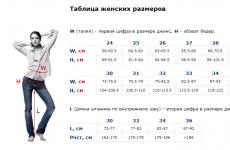Until what age do they give gifts for children at work? New Year's gifts for children from the social fund, employer and trade union: rules for provision and accounting Until what age does the company give gifts to children?
There is no greater joy than seeing the delight of a child who finds a gift from Santa Claus under the Christmas tree. Employers also understand this - they try to pamper the children of their employees with New Year's surprises. If a trade union has been created at an enterprise, then, as a rule, this high mission is entrusted to it. The state, represented by the Social Insurance Fund for Temporary Disability, does not miss the opportunity to play the role of Santa Claus. Next, we’ll talk in detail about the rules for providing and accounting for children’s New Year’s gifts from various sources.
Gifts from the Social Security Fund
Providing New Year's gifts to children of insured persons at the expense of the Social Insurance Fund for Temporary Disability ( Further- Fund) - one of the types of social services (clause 6, article 34). This process has been settled.
Remember! You cannot buy children's gifts on your own and count their value against payments to the Fund - employers receive gifts from the Fund and then give them to employees.
Let's look at the procedure for providing such gifts step by step.
Step 1. The employer compiles a list of parents whose children are entitled to a gift.
The list is compiled in any form and can be formatted as follows:
When compiling a list, you need to take into account that the following are eligible for a gift:
- workers at the main place of work if they have children under 14 years of age(a child who will be 14 years old as of January 1, 2014 cannot receive a gift). Part-time workers, as well as persons working under civil contracts, cannot receive a gift for their child from the Foundation;
- child's parents ( father mother, adoptive parent, guardian/trustee). If both parents (mother and father) work at the same enterprise, having, for example, two children, then 4 gifts from the fund are allocated for their family. Grandmother, grandfather, sister, brother, etc. are not entitled to receive a gift even if the child’s parents do not work;
- insured persons who are in an employment relationship with the employer at the time the gift is provided. The number of insured persons also includes persons on maternity leave (including for a newborn child, if at the time of making the decision to allocate gifts from the Fund, the insured person provides a document on the birth of the child), as well as on parental leave up to 3 years old - their children are also entitled to a gift. Persons caring for a child from 3 to 6 years old, according to a medical certificate, are not insured by the Fund, therefore there is no right to receive a gift in this case.
Step 2. The employer submits an application for the allocation of children's New Year's gifts to the FVPT at the place of registration as an insured.
Neither the deadline for filing an application nor its form are established by Procedure No. 48, as was written about in the material. We recommend that you clarify these points at the Fund branch at the employer’s place of registration.
Step 3. The employer's responsible person receives gifts from the Fund.
Gifts are issued by invoice on the basis of a power of attorney provided by the employer's representative to receive inventory items.
Step 4. The social insurance commission (commissioner) makes a decision on issuing gifts to insured persons.
Such a decision is documented in a protocol. Let us note that in the form of the protocol given in the appendix to, there is no section on the provision of this type of social services. In this regard, the commission (authorized) can:
- or independently make changes to the form of the protocol, supplementing it with section IV “We will insure children’s new gifts to persons” with a list of such persons, the number of gifts, the names of parents and their children, the age of the children;
- or draw up a separate protocol in any form, borrowing the “header” of the protocol from Regulation No. 25.
Step 5. The financially responsible person of the employer draws up a Statement for issuing children's New Year's gifts.
This responsibility can be assigned to a member of the commission (authorized) for social insurance. The statement is compiled in any form. In order not to duplicate information, we recommend that when compiling a list of employees entitled to a gift (the example is given above), add a column about the issue (date and signature of the employee). The statement for the issuance of gifts must be signed by the head and the chairman of the commission (authorized) for social insurance and sealed with the employer’s seal (clause 3.5 of Procedure No. 48).
Step 6. We reflect the fact of issuing gifts in accounting and reporting.
Cost of gifts:
- only reflected in accounting behind the balance sheet: receiving gifts from the Fund - on the debit of subaccount 025 “Material assets of the principal”, issuing gifts from employees - on the credit of the same subaccount;
- not reflected in the tax accounting of the enterprise, neither as part of income upon receipt, nor as part of expenses upon issue, since ownership of gifts does not pass to the employer;
- is not subject to VAT, since this operation is not a supply in accordance with paragraphs. 14.1.191;
- not reflected in the profile Report on;
- not subject to personal income tax based on paragraphs. 165.1.1 NKU;
- not subject to unified social tax, since such payments are not included in the wage fund in accordance with clause 3.2, and therefore are not subject to ESC taxation;
- is given in Tax calculation according to f. No. 1DF with income indicator “128” (social benefits). Columns 4 and 4a are filled with zeros.
Be careful! If New Year's gifts are issued in violation (for example, for a child over 14 years old or a part-time employee; in the absence of a decision of the commission (authorized) or a statement on the issuance of gifts), their cost must be reimbursed by the policyholder. For such violations, the Fund may impose a fine on the policyholder in the amount of 50% of the amount payable (50% of the value of gifts issued in violation). In addition, an administrative fine may be imposed on officials of the policyholder under Art. 165 5 in the amount from 136 to 255 UAH.
As for private entrepreneurs with children under the age of 14, such persons have the right to receive a gift subject to their voluntary insurance in the Fund,T. e. payment of unified social contributions at an increased (36.6% or 38.11%) rate. In this case, to receive a gift, the entrepreneur must submit an application to the Fund in the manner discussed above.
Gifts from employer
If the employer believes that a gift from the Fund to the children of employees is not enough, he can provide additional gifts at his own expense. In terms of documentation, there are no special requirements here: the person in charge of the employer compiles lists of employees’ children, gifts are purchased, and then given out according to a list drawn up in any form. The employer determines the age limit independently, but we recommend not giving gifts to children over 18 years of age.
Now let's figure out how such generosity turns out to the employer from a tax perspective?
Personal income tax. There is no special benefit for children's New Year's gifts in the NKU, however, there is a general “gift” benefit provided for in paragraphs. 165.1.39 NKU. According to this norm, the value of a non-cash gift that does not exceed 50% of one minimum wage established as of January 1 of the reporting tax year (in 2013 - 573.50 UAH) is not subject to personal income tax. The legality of this benefit for children's New Year's gifts is confirmed by tax officials (letters from the State Tax Service dated December 2, 2011 No. 6711/6/17-11/5 and dated October 8, 2012 No. 2972/0/51-12/17-1115). At the same time, the limit on the amount (573.50 UAH) is set on a monthly basis, and not cumulatively for the year.
The value of the gift exceeding this amount is included in the taxable income of the employee (parent of the child) and is subject to personal income tax at a rate of 15% (17%). Moreover, since income is paid in non-monetary form, a “natural” coefficient is applied.
Let's give an example of a calculation. Let's say a generous employer gives the children of employees a gift worth UAH 700.00. Taxable income when applying a rate of 15% is calculated as follows:
(700 – 573.50) x 1.1765 = 148.83 UAH.
Personal income tax amount:
148.83 x 15% = 22.33 UAH.
In the Tax Return according to f. No. 1DF New Year's gift is reflected with a sign of income:
- "160"-in the non-personal income tax portion (within 573.50 UAH);
- "126"(additional benefit) - in the part subject to personal income tax. We determine income taking into account the “natural” coefficient.
Note. An employer who independently purchases gifts for children cannot take advantage of the personal income tax benefits provided for the New Year. Another thing is the purchase of gifts through the trade union, which we will discuss later.
Apply here the benefit under paragraphs. 170.7.3 of the Tax Code established for non-targeted charitable assistance, in our opinion, is incorrect, since gifts are purchased and given to employees according to a statement for a very specific purpose.
EMU. These payments are not subject to the unified social tax, since the cost of gifts for holidays for the children of employees does not apply to the wage fund, clause 3.23 of Instruction No. 5. In addition, the cost of such gifts is included in the list of payments made at the expense of employers, which are not used EMU is accrued (clause 8, section II).
Income tax. From a taxation perspective, the issuance of children's New Year's gifts is nothing more than a sale (clause 14.1.202 of the Tax Code of Ukraine). Before the rules for applying regular prices were changed (remember, this happened from 09/01/2013 according to the Law of Ukraine “On Amendments to the Tax Code of Ukraine regarding Transfer Pricing” dated 07/04/2013 No. 408-VII), income tax payers had to reflect for such operations the income is based on regular prices. At the same time, they could also reflect expenses in the form of the cost price of the gifts transferred, guided by the Generalized Tax Consultation on the procedure for determining income and expenses for transactions involving the free transfer of goods (works, services), approved by Order of the State Tax Service of July 5, 2012 No. 581.
At the moment the situation has changed. Regular prices generally now apply only to transactions that are considered controlled, and giving gifts to children for the New Year clearly does not apply to such transactions. Therefore, we are guided by the general rules for recording income. Income from the sale of goods is recognized in the amount of the agreed (contract) value, but not less than the amount of compensation, received in any form (clause 135.4 of the Tax Code). In this case, the contractual value is zero, there is no compensation. Consequently, the company reflects income from such an operation in the amount of 0 UAH. In this case, the enterprise will not have the right to expenses due to the non-economic nature of this operation (clause 139.1.1 of the Tax Code). Thus, everything fell into place in this matter.
When talking about tax consequences on profits, you need to take this point into account. If there is a trade union at the enterprise, then it is more profitable for the enterprise not to purchase gifts on its own, but to transfer money to the trade union organization. In this case, you have the right to expenses in the amount of 4% of the taxable profit of the previous reporting period in accordance with Art. 1 of Law No. 2117. In addition, there is a rule directly in the Tax Code (clause “b” clause 138.10.6 of the Tax Code) allowing the inclusion in expenses of funds transferred to the trade union for cultural events, within 4% of taxable profit for the previous reporting period year.
When using this rule, it must be taken into account that, firstly, such expenses must be provided for by the collective agreement. Secondly, when determining the amount that can be included in expenses, other voluntary transfers to non-profit organizations and to the budget specified in paragraphs are taken into account. "a" pp. 138.10.6 NKU. Thirdly, there is an exception regarding transfers to the trade union: if, based on the results of the previous reporting year, taxable profit is zero, the amount of funds transferred by employers to trade unions for cultural, physical education and recreational work, which is included in expenses, is determined taking into account taxable profit, received in the previous reporting year, but not earlier than for the four previous reporting years.
VAT. Here, too, changes occurred after Law No. 408 came into force. Free transfer of goods is considered a supply for VAT purposes (clause 14.1.191 of the Tax Code of Ukraine). In turn, the tax base for transactions for the supply of goods in the general case is negotiated price, and for controlled operations - the contractual cost, but not lower than regular prices (clause 188.1 of the Tax Code).
So, the VAT tax base for simple (uncontrolled) transactions is determined based on the contract price, and in this case it is equal to zero. Consequently, when purchasing gifts, the VAT payer does not generate a tax credit (non-economic use), and when giving gifts to employees, a tax liability of 0 UAH is assessed. At the same time, he must issue a tax invoice, both copies of which he keeps.
If the employer, when purchasing gifts, included the amount of VAT in the tax credit, then when giving them to employees, he accrues tax liabilities for VAT in the same amount (based on the cost of purchasing the gifts). The basis is non-economic use of goods (clause 189.1 and paragraph “d” of clause 198.5 of the Tax Code).
Example. The company purchased 10 gift sets with sweets for the children of its employees with a total cost of 600 UAH, including VAT - 100 UAH. Accordingly, the cost of one gift is 60 UAH. VAT included.
| № p/p |
Contents of a business transaction | Accounting | Amount, UAH | Tax accounting | ||
| Dt | CT | Income | Expenses | |||
| 1 | Prepayment for gifts was transferred to the supplier | 377 | 311 | 600,00 | – | – |
| 2 | Gift sets received | 209 | 631 | 600,00 1 | – | – |
| 3 | Settlement of debts reflected | 631 | 377 | 600,00 | – | – |
| 4 | A gift was given to an employee (using the example of the 1st gift) | 377 | 209 | 60,00 2 | – | – |
| 5 | The employee's debt is written off for company expenses | 949 | 377 | 60,00 | – | – |
| ____________ 1 The right to a tax credit does not arise (non-economic use). If the employer reflects a tax credit when purchasing gifts, then when given to employees, VAT obligations must be assessed. The following entries will be made in the accounting: Dt 377 - Kt 641/VAT and at the same time Dt 949 - Kt 377. 2 The cost of the gift did not exceed 573.50 UAH, therefore personal income tax is not withheld from its cost. In Tax calculation according to f. No. 1DF, such income is reflected with the indicator “160”. |
||||||
Gifts from the union
If there is a trade union at the enterprise, the burden of providing the employees' children with New Year's gifts, as a rule, falls on it.
In documentary terms, such an event is formalized by the following documents:
- an estimate of income and expenses, which provides for New Year's gifts for the children of workers - members of the trade union;
- decision of the trade union committee on the issuance of children's New Year's gifts. Here you should determine the type of gift (sweets, toys, books, etc.) and the maximum amount of expenses for one gift;
- list of children who are entitled to a New Year's gift. The trade union committee sets the age limit independently;
- statement for issuing children's New Year's gifts in any form. The fact that the child’s parent has received the gift is certified by his signature on the statement.
In addition, the union must keep a document (invoice, check, etc.) confirming the purchase of gifts.
Personal income tax. There are several reasons for not including the value of a gift in the taxable income of the child's parent:
1) New Year's benefit - Art. 3 of Law No. 2117. According to this norm, the cost of holiday gifts and tickets to New Year and Christmas events received by parents for their children from state authorities, local governments, public (incl. trade union) organizations and educational, health and cultural institutions created by them, maintained at the expense of the relevant budgets, not included in parents' taxable income.
Gifts for these purposes are sets of goods containing only domestically produced confectionery and toys and fruits, total cost no more than 91.76 UAH.
Please note that this benefit applies to the issuance of gifts in the period from November 15, 2013 to January 15, 2014.
In Tax calculation according to f. No. 1DF, gifts in the non-taxable part should be reflected with the attribute “127” (other income), and in the taxable part - “126” (additional benefit);
2) gift benefit - pp. 165.1.39 NKU. We discussed this benefit in detail above when considering the taxation of gifts from an employer. All business entities, including trade unions, have the right to apply this benefit (joint letter of the State Tax Administration and the Federation of Trade Unions of Ukraine dated February 15, 2011 No. 4284/7/17-0717, 3071/6/17-0715, 58/01-16 /330 and letter of the State Tax Administration of December 2, 2011 No. 6711/6/17-11/5). If the trade union gives out gifts that do not meet the requirements of Law No. 2117 (for example, book products), then the gift worth up to 573.50 UAH. You may not be subject to personal income tax on this very basis.
In Tax calculation according to f. No. 1DF the cost of the gift is reflected with the following indicator:
- “160” - in the non-taxable part;
- “126” - in the part subject to personal income tax. Income is determined taking into account the “natural” coefficient;
3) trade union benefit - paragraphs. 165.1.47 NKU. It says here that personal income tax is not levied on the amount of payments or compensation (except for wages or other payments and compensation under civil contracts) made by trade unions to their members during the year in the aggregate in an amount not exceeding 1,610 UAH. (in 2013). Please note that the amount limit is set on a per year basis.
To apply this benefit, payment must be made in the amounts and for the purposes established by the trade union.
In Tax calculation according to f. No. 1DF, the value of the gift on this basis is given with the following sign:
- “167” - in the non-personal income tax portion;
- “126” - in the part subject to personal income tax. Taxable income is determined taking into account the “natural” coefficient.
ESV. The issue with the ERU does not arise, since parents who are members of the trade union are not employees of the trade union. In addition, such a payment, as mentioned above, is not included in the wage fund (clause 3.23 of Instruction No. 5) and is included in the list of payments not subject to EMU (clause 8 of Section II of List No. 1170).
Income tax. Providing the children of employees who are members of the trade union with New Year's gifts is carried out within the framework of their statutory activities. Consequently, the union does not reflect either income or expenses in the tax accounting of profits for these operations. This also applies to funds received from the employer to finance such an event (paragraph one of clause 157.9 of the Tax Code).
VAT. Among trade unions you will not often find payers of this tax. If the trade union is nevertheless registered as a VAT payer, then when purchasing gifts, the amount of VAT included in their cost can be included in the tax credit. When issuing gifts, the trade union is obliged to accrue VAT liabilities in the same amount.
Veronica Chernysheva
Then, when drawing up a gift agreement, contributions for insurance against personal injury and health insurance are not charged on the cost of gifts, since in this case the gifts are given not within the framework of an employment relationship with the employee, but within the framework of a civil contract concluded with him, which does not provide for the payment of insurance contributions from NS and PZ.
2. Year-end bonus
In accordance with part 1 of Art. 22 and Art. 191 of the Labor Code of the Russian Federation, the employer has the right to encourage employees who conscientiously perform their job duties (declaring gratitude, giving a bonus, awarding a valuable gift, a certificate of honor, nominating them for the title of the best in the profession).
According to Art. 129 and art. 135 of the Labor Code of the Russian Federation, bonuses, additional payments and incentive allowances, as well as other incentive payments are an integral part of the salary that is established for the employee by the employment contract in accordance with the current remuneration systems. Remuneration systems are established by collective agreements, agreements, local regulations in accordance with labor legislation and other regulations containing labor law standards.
Direct payment of the bonus is carried out on the basis of an order or instruction from the head of the organization, since it is the order (instruction) that confirms the achievement of bonus indicators in a specific period (month, quarter, year). The order is drawn up in form N T-11 (T-11a), approved by Resolution of the State Statistics Committee of Russia dated January 5, 2004 N 1.
2.1. Corporate income tax
In accordance with Art. 252 of the Tax Code of the Russian Federation reduces the income received by the amount of expenses incurred (except for the expenses specified in Article 270 of the Tax Code of the Russian Federation). In this case, these expenses must be economically justified, documented and aimed at generating income.
According to Art. 255 of the Tax Code of the Russian Federation, the taxpayer’s expenses for wages include any accruals to employees in cash and (or) in kind, incentive accruals and allowances, compensation accruals related to working hours or working conditions, bonuses and one-time incentive accruals, expenses associated with the maintenance of these employees, provided for by the norms of the legislation of the Russian Federation, labor agreements (contracts) and (or) collective agreements.
At the same time, paragraph 2 of Art. 255 of the Tax Code of the Russian Federation stipulates that labor costs include accruals of an incentive nature, including bonuses for production results, bonuses to tariff rates and salaries for professional skills, high achievements in work and other similar indicators.
Considering that in the situation under consideration, the payment of bonuses at the end of the year is provided for by the labor and (or) collective agreement, such expenses on the basis of Art. 255 of the Tax Code of the Russian Federation can be taken into account when determining the tax base for income tax. Similar explanations are contained in letters of the Ministry of Finance of Russia dated 02/26/2010 N 03-03-06/1/92, dated 07/10/2009 N 03-03-06/1/457, dated 05/14/2009 N 03-03-05/88, dated 03/19/2007 N 03-03-06/1/158, dated 03/06/2007 N 03-03-06/1/151, Federal Tax Service of Russia for Moscow dated 12/19/2008 N 19-12/118853.
) Credit Credit 50 "Cash"
- the premium was paid from the cash register.
Prepared answer:
Expert of the Legal Consulting Service GARANT
professional accountant Molchanov Valery
Response quality control:
Reviewer of the Legal Consulting Service GARANT
auditor Melnikova Elena
The material was prepared on the basis of individual written consultation provided as part of the Legal Consulting service.
There is nothing in any law about New Year's gifts for children. However, such gifts may be specified in a collective agreement or in the charter of the enterprise. Then the employer is obliged to act in accordance with these documents.
Rules for receiving gifts
If the agreement or charter of the enterprise clearly states the procedure for receiving gifts, then it must be followed. If clear rules are not established, then everything happens at the discretion of the employer. For example, at our enterprise we had the following options:
2014 - New Year's gift for an employee (champagne, box of chocolates, calendar)
2015 - New Year's gift for each child (certificate for a bookstore)
2016 - again each employee receives a certificate for a child under 12 years old
In good years there are more gifts, and in times of crisis - thanks for any kind.
Replacement gifts for events
Companies often hold New Year's events for the children of their employees. Such activities can also be implemented in different ways:
On your own. If the team is sufficiently united, then you can independently, with the direct support of the employer, organize a holiday for the children. Competitions, small gifts. The budget is most likely a joint one, although the organization may pay for everything.
Outdoor Christmas trees. An organized trip to the New Year tree for children from one company or tickets to centralized performances.






